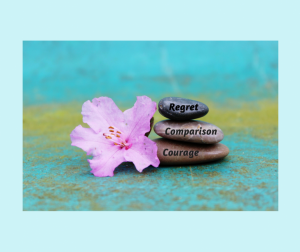Thursday
Opinion PiecesRegret, Comparison, Courage
 A while back some topics came to mind: regret, comparison, and courage. I’m going to make an assumption that all of us are probably intimately familiar with the first two, but are hesitant to admit to our courageous side. It might be good for ourselves as well as the others in our lives if we started noticing the many ways we act courageously. Let’s begin by looking at regret.
A while back some topics came to mind: regret, comparison, and courage. I’m going to make an assumption that all of us are probably intimately familiar with the first two, but are hesitant to admit to our courageous side. It might be good for ourselves as well as the others in our lives if we started noticing the many ways we act courageously. Let’s begin by looking at regret.
Regret, as a noun rather than a verb, is defined as “a feeling of sadness, repentance, or disappointment over an occurrence or something that one has done or failed to do.” The magazine Psychology Today has some interesting things to say about regret that I think are worth mentioning. Some studies show that regret is the second-most common emotion people mention in daily life. It’s the most common negative emotion. We start expressing regrets at around the age of two—as soon as we’re able to articulate the concept of “If only…” And thereafter, we’re continually rewriting history in our heads, instead of playing the cards in our hand.
The article goes on to say that it isn’t actually so bad to think, “I wish I would have…” It is what comes next that really matters. I found this next statement so true: “Regret is only toxic when it becomes habitual, when we develop the reflex to chew and chew on an unfortunate turn of events, like a cow chewing on its cud, until there’s not a lick of nutrition left in it; by contrast, as something to dial up and analyze once, a regrettable experience can be quite useful.”
I think a common regret is when someone we love dies. We wish we would have been more available to that person, or said something we always wanted to say to him or her, or hadn’t said what we said before they died, and on and on it goes. There are of course smaller regrets” I wish I had have left that party a little sooner, orI wonder what would have happened if only I had listened to so-and-so. We can think of our regrets as our own inherent wisdom coming through, reminding us of our goodness when we slip. The good news is that we will have many opportunities to practice working with this throughout our lives.
Comparison can be defined as “a consideration or estimate of the similarities or dissimilarities between two things or people.” Take a minute to think about how many times you’ve heard someone say, “I wish you were more like Joe or Jane.” How many times have you thought, “I wish I could be more like him; he is so smart and kind.” Or, “She is so calm and collected – if only I were more like her.” Parents, bless their hearts, sometimes do this with their children, potentially and unintentionally pitting two siblings against one another. I remember this dynamic in my own upbringing. “Why can’t you be more like Susie, why do you always have to fight us and be so contrary?” Or, “Betsy is the smart one. Susie is the shy quiet one.” Happily my sister and I had a very strong bond, and we didn’t let this come between us. My parents meant no harm. They just were doing what they could to manage such a big and diverse group of children the best they knew how.
 I’ve been thinking about the ease with which we compare ourselves to others. It’s a very common practice, and quite acceptable in our society. I don’t think there is anything inherently wrong with it, but I think it can be a slippery slope just like regret. It’s always good to know what the motivation and intention is behind anything we do, and this is no different. If we do it in order to aspire to something we admire about another person, and use it as a motivator to cultivate our own ability to “be more like that,” then I think it can be very healthy. If we use it to beat ourselves up and confirm and solidify our own feelings of inadequacy–then not so good, right?!
I’ve been thinking about the ease with which we compare ourselves to others. It’s a very common practice, and quite acceptable in our society. I don’t think there is anything inherently wrong with it, but I think it can be a slippery slope just like regret. It’s always good to know what the motivation and intention is behind anything we do, and this is no different. If we do it in order to aspire to something we admire about another person, and use it as a motivator to cultivate our own ability to “be more like that,” then I think it can be very healthy. If we use it to beat ourselves up and confirm and solidify our own feelings of inadequacy–then not so good, right?!
Courage. Defined as “strength in the face of pain or grief is one way to define courage, and the ability to do something that frightens us.” The latin root of courage is ‘cor’ which means ‘heart;’ I liken this to what we say in Shambhala, ‘The Heart of Warriorship.’ It takes courage, which comes from our heart, to be fully present in our lives.
I stated at the beginning that we often don’t recognize our own courage. I think those of us who have difficulty admitting to our own bravery may think that it has to be some BIG act of courage in order for it to really matter. This is unfortunate. It is often the small everyday acts of kindness and caring that can make our day and lift our hearts. This is also true when it comes to acting courageously.
 Consider this: what if every time we did something that was a little hard for us, we just quietly said to ourselves, “That took some courage.” I’ll give a personal example. It is sometimes hard for me to ask for help when I know I can do it myself, but I just don’t have time. So when I ask for help, I could acknowledge my own good heart, my courage in being able to ask. Another example is when someone asks me for my opinion about something, and I am pretty certain that my real opinion might lead the other person to question their own opinion of me. What if when I answer honestly I say to myself, “That took some courage.” Go ahead and think of your own examples. And if you have the time to contemplate this notion of courage a little bit each day, you may be pleasantly surprised how brave you actually are!
Consider this: what if every time we did something that was a little hard for us, we just quietly said to ourselves, “That took some courage.” I’ll give a personal example. It is sometimes hard for me to ask for help when I know I can do it myself, but I just don’t have time. So when I ask for help, I could acknowledge my own good heart, my courage in being able to ask. Another example is when someone asks me for my opinion about something, and I am pretty certain that my real opinion might lead the other person to question their own opinion of me. What if when I answer honestly I say to myself, “That took some courage.” Go ahead and think of your own examples. And if you have the time to contemplate this notion of courage a little bit each day, you may be pleasantly surprised how brave you actually are!
Below are a few quotes on courage. I didn’t include any from the cowardly lion of the Wizard of Oz, but did come across some which put a smile on my face!
“He who is not courageous enough to take risks will accomplish nothing in life.” Muhammad Ali
“Take chances, make mistakes. That’s how you grow. Pain nourishes your courage. You have to fail in order to practice being brave.” Mary Tyler Moore
“Efforts and courage are not enough without purpose and direction.” John F. Kennedy
Thanks for reading. Please remember to be kind to yourself.
I would like to dedicate this month’s blog to a good friend of mine who was a very courageous man. This one’s for you Fred Mather! January 29, 1949 – June 10, 2018.
Susan Firer is a co-founder of Windhorse Retreat Center. This piece originally appeared on the Center’s blog page, at https://windhorse.shambhala.org/blog .






Jun 29, 2018
Reply
Many thanks for sharing this piece today.
Jun 29, 2018
Reply
Thank you. We need courage now, both in our community and in the world, and we have it in us. Your reminder to notice its arising is timely. I especially appreciate the Mary Tyler Moore quote about needing practice to cultivate courage. Our “failings” are building the muscles of courage.